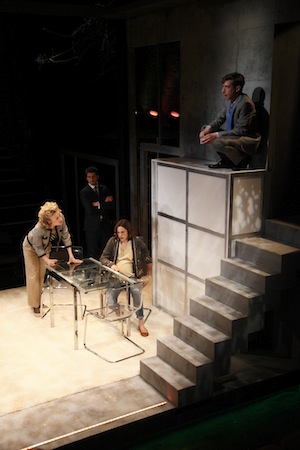There is something forensic about Marius von Mayenburg's examination of human nature in this 2004 play, written when he was in his early 30s and the Iraq war still on the television news. Eldorado, a money-making project to rebuild some of the devastated areas of a city - divided, invaded, bombed - is in a long line of ventures undertaken by colonialists and conquerors. Hence its name, reminiscent of European, gold-inspired adventures in South America in the sixteenth century. The place in this case is unnamed. The lines between "there" (dangerous, out of control) and "here" (clean, safe, civilised) are blurred so that the unpleasant reverberations of death, damage and suffering can be flicked away by a remote control, but we are never sure how near they are geographically. It doesn't matter; they are remotely controlled or rather response to them can be; they are kept at a distance.
Control, however, is less easy to maintain in the potentially perfect little family mixed up in the regeneration plans. Anton (Michael Colgan) is a developer married to Thekla, a pianist. Thekla (Amanda Hale) is pregnant and Anton plants a birch tree in honour of the unborn child in their newly groomed garden. Amanda's rich mother Greta (in a gloriously fruity performance by Sian Thomas) is an amalgam of lust, cruelty, selfishness and greed. She has good-looking young Oskar in tow to satisfy all her needs, which he does, unashamedly, in order to enjoy her money. Anton's boss, Aschenbrenner, perceives the devastation clearly enough, but also sees the potential opportunity, at least to begin with. Greta invests. Things go pear-shaped. Anton loses his job but keeps up a pretence of going to work, instead wandering in the forest, staring at fish in a fish shop and taking a room in a hotel to get out of the rain.
 It is easy enough to report what these characters do, but they never quite become flesh and blood. Fish imagery recurs. Anton stares at lobsters, sometimes gapes like one and casts fish food over people while sitting atop a cupboard having suffered a breakdown (pictured left). Mayenburg seems to be saying that human beings are destined to repeat patterns endlessly, like other natural phenomena with less developed brains. Shouldn't art make a difference? The piano is much in evidence, but once playing becomes a matter of success or failure, just another aspect of bourgeois competitiveness, all joy in it, all passion is lost. Thekla's student, Manuela, seems to recognise this and perhaps represents some hope for the future. Although emotional engagement is kept to a minimum, the imagery in Mayenburg's dialogue (as translated by Maja Zade) can be disarmingly lyrical or graphically brutal.
It is easy enough to report what these characters do, but they never quite become flesh and blood. Fish imagery recurs. Anton stares at lobsters, sometimes gapes like one and casts fish food over people while sitting atop a cupboard having suffered a breakdown (pictured left). Mayenburg seems to be saying that human beings are destined to repeat patterns endlessly, like other natural phenomena with less developed brains. Shouldn't art make a difference? The piano is much in evidence, but once playing becomes a matter of success or failure, just another aspect of bourgeois competitiveness, all joy in it, all passion is lost. Thekla's student, Manuela, seems to recognise this and perhaps represents some hope for the future. Although emotional engagement is kept to a minimum, the imagery in Mayenburg's dialogue (as translated by Maja Zade) can be disarmingly lyrical or graphically brutal.This is the British premiere of Mayenburg's play, previously presented in Berlin, and the first production by a new company, Mongrel Thumb, "formed out of a love of all things unpredictable". The director Simon Dormandy, until 2012 Director of Drama at Eton College, delivers a clean-edged production and his cast give excellent - if for the most part slightly detached - performances in designer Georgia Lowe's suitably minimalist interior.
Marius von Mayenburg, who has already had considerable success in the UK (notably with Fireface at the Royal Court), is an important writer whose work reverberates in the mind long after the curtain calls. In this instance, it does not often, however, engage the heart.















Add comment